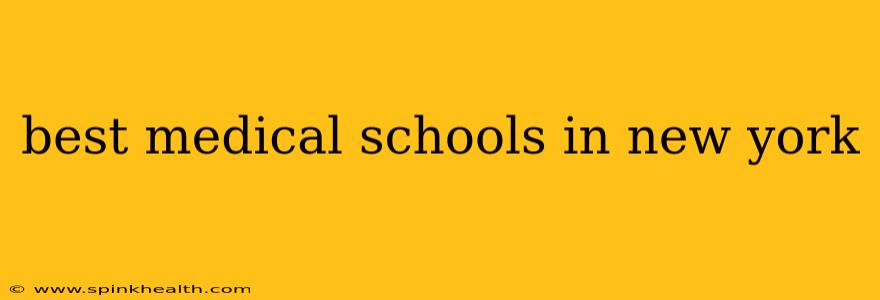New York, a global hub for innovation and healthcare, boasts some of the most prestigious medical schools in the world. Choosing the right medical school is a monumental decision, demanding careful consideration of factors beyond just rankings. This journey will delve into the top contenders, exploring their unique strengths and what sets them apart. We'll go beyond simple lists, exploring the vibrant academic culture, research opportunities, and overall student experience.
What Makes a Medical School "Best"?
Before diving into the specifics, let's define what constitutes a "best" medical school. It's not simply about prestige or rankings, although those are certainly factors. A truly excellent medical school offers:
- Rigorous academics: A challenging curriculum that pushes students to their limits and prepares them for the complexities of medical practice.
- Exceptional faculty: Renowned experts in their fields who are dedicated to teaching and mentoring.
- Cutting-edge research opportunities: Access to state-of-the-art facilities and involvement in groundbreaking research projects.
- Strong clinical experiences: Ample opportunities to work with patients in diverse settings, gaining practical skills and valuable experience.
- Supportive learning environment: A collaborative and inclusive atmosphere where students feel supported and challenged.
Top Contenders: A Closer Look at New York's Medical Schools
While creating a definitive "best" list is subjective and depends on individual priorities, several New York medical schools consistently rank among the nation's elite. Let's explore some of them:
1. Icahn School of Medicine at Mount Sinai:
The Icahn School of Medicine at Mount Sinai is renowned for its research prowess and its location in the heart of Manhattan. It's a powerhouse of innovation, consistently pushing the boundaries of medical knowledge. The close integration with Mount Sinai Hospital provides students with unparalleled clinical exposure. Imagine yourself immersed in a vibrant research environment, collaborating with leading experts and contributing to groundbreaking discoveries. This is the reality for students at Icahn.
2. Columbia University Vagelos College of Physicians and Surgeons:
Columbia's medical school, a part of the Ivy League, boasts a long and illustrious history. Its reputation for rigorous academics and a strong emphasis on research is undeniable. Studying here means becoming part of a rich intellectual community, benefiting from the resources of a world-class university. Students gain access to state-of-the-art facilities and collaborate with leading researchers across various disciplines.
3. Weill Cornell Medicine:
Weill Cornell Medicine is known for its highly competitive admissions process and its commitment to excellence in both teaching and research. Located in the heart of New York City, it offers students unparalleled access to diverse patient populations and cutting-edge technology. The school's strong emphasis on collaboration fosters a supportive learning environment where students thrive. Imagine the satisfaction of directly contributing to patient care while working alongside top medical professionals.
4. New York University Grossman School of Medicine:
NYU Grossman School of Medicine is a relatively newer institution but has rapidly established itself as a major player in medical education. It's celebrated for its innovative curriculum, its focus on primary care, and its commitment to serving diverse communities. The urban setting offers unique opportunities for clinical experience and exposure to a wide range of patient populations, making it ideal for those seeking a dynamic and engaging learning environment.
Frequently Asked Questions (FAQs)
What are the admission requirements for medical schools in New York?
Admission to New York medical schools is highly competitive. Applicants generally need a strong undergraduate GPA, high MCAT scores, significant volunteer or research experience, compelling personal statements, and strong letters of recommendation. Each school has its specific requirements, so checking individual websites is crucial.
How long does it take to become a doctor in New York?
Becoming a doctor in New York typically takes about eight years after high school: four years of undergraduate education, followed by four years of medical school. This is followed by a residency program, the length of which varies depending on the specialty.
What are the career prospects for medical school graduates in New York?
New York offers excellent career prospects for medical school graduates, with a high demand for physicians across various specialties. The state's diverse population and extensive healthcare system provide ample opportunities for employment and specialization.
Are there any scholarships or financial aid opportunities for medical students in New York?
Yes, various scholarships and financial aid opportunities are available to medical students in New York. This includes merit-based scholarships, need-based grants, and loan programs. It's recommended to check with individual medical schools and external organizations for available funding options.
How important is research experience for medical school admissions in New York?
Research experience is highly valued in medical school applications in New York. It demonstrates commitment, research skills, and the ability to contribute to scientific advancements in the field.
Choosing the "best" medical school is a deeply personal decision. This exploration of New York's top contenders provides a starting point. By carefully considering your individual priorities and researching each school thoroughly, you can confidently embark on your journey toward a rewarding career in medicine.

